Cartoons have had a long history, predating cinematography. Little flip books were around before the movies arrived. There have been the powerhouses of Disney and Warner Brothers who brought us Mickey Mouse and Bugs Bunny, right through to the modern computer generated animations of Pixar and others.
Magical
The magic, and core power, of animation is that it allows the director complete control and creative freedom. No restrictions on actors or physically creating sets or finding locations. Whatever you can imagine and draw can be your reality. It is this level of creative freedom that sees Qtoons showing off a wild variety of stories in a quintet of LGBTQ short animations.
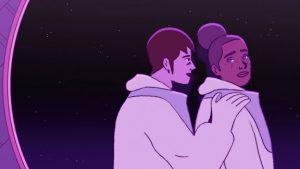
Take “In Orbit”, for example, which is set on a space station in the far future. The cost of a live- action movie version would’ve been astronomical (if you forgive the pun). The story explores the troubling memories that haunt Sonia, who on the day of a massive party is caught up in her regrets of a tragic accident. She might be moving to a new assignment on a different space station but the past won’t leave her alone. Although the animation style might seem a little simplistic, compared to the fancy CGI used on so many film these days, it’s atmospheric and moving.
“Of Aska” also manages to create its own little world, where two women are happily living together in a forest. Despite the hardships, they find themselves facing they have found a place they are accepted and can live in peace. However, Aska starts to change and it’s up to her partner to decide on how to deal with that, whether she can accept what’s happening or fight it. This short manages to transport us to their remote hut and wrap us up in their story, with Aska’s transformation being shown in an other-worldly way that animation is ideal for.
Educational
A cartoon is often an ideal way to share information. Many public information films have used animation, even when aiming at adults. Maybe this harks back to childhood and provides a gentle way to make a point. “Out of syllabus – Gender Identity” takes this approach and even sets the 5-minute musical animation in a classroom, where it explains about gender identity and and gender dysphoria in an accessible manner. The nursery rhymes, which have their lyrics re-written, provide a catchy way to share a message of tolerance for those who don’t fit neatly into the typical binary view of sexuality.
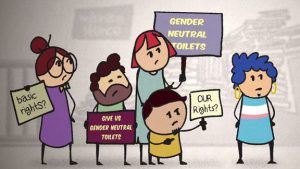
A different type of animation is used for “Chromophobia”. Stop-motion might be more famous for cartoons like South Park, but here it is used to create a colourful rendition of a gay man’s life. It follows right from his childhood and playing with dolls and having a female friend put make-up on him, through to him discovering he loves boys and not girls. Towards the end the flexibility of the format allows for a surreal section where he turns into a mermaid and is chased by a shark. The style, which is quite jerky, can be sometimes a little tough to watch but this short still manages to wordlessly take us through the plight of this man who is just trying to be who he is despite the obstacles in his way.
Enlightening
The Qtoons programme finished with “Top 3” which, despite only being 45 minutes long, almost felt like watching a feature film. With an individualistic style, it’s colourful and smooth moving, with a great supporting soundtrack which complements the visuals.
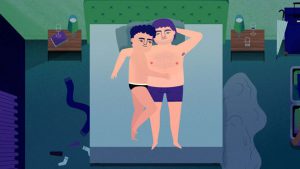
The story follows Anton, a boy who likes to be organised, loves his home town and a quiet life. All that is about to be thrown into disarray when he falls for a boy who wants to explore and escape the humdrum life.
“Top 3” then tenderly follows their relationship, making you care about the couple and their dreamy summer of living together. This makes you emotionally invested when they start to realise that maybe not all is well and that they crave different things.
Part of what I liked most about this film what that it just felt like a natural relationship. There was nothing that was preachy about LGBTQ issues, it was a story of two people who fell in love and had to deal with their issues, just like any other couple would. Up to a point I would say that “In Orbit” and “Of Aska” are also similar, in terms of concentrating on a story that isn’t primarily about sexuality, but would be appreciated by an LGBTQ crowd because they could see themselves represented on screen in a way mainstream media doesn’t often do.
Congratulations to KASHISH 2020 for a wide variety of cartoons. It certainly makes for some imaginative and compelling watching, something different to the rest of the programming over the length of the Festival. Maybe there could be two sets for next year? If enough submissions could be found.
The KASHISH Mumbai International Queer Film Festival is about to start its 11th edition. This year the festival has gone virtual, meaning now that viewers around the world can watch some of the 157 films from 42 countries which will be screened. It starts on 22nd July 2020 and finishes on 30th July 2020. Find the full schedule here: http://mumbaiqueerfest.com/schedule/
Buy your tickets here: http://mumbaiqueerfest.com/attend/
Jonathan has a varied history, having written for publications such as Asian Woman but also technical magazines such as Networking+. He also has a background in IT so he's been instrumental in the technical side of getting Global Indian Stories launched. As co-founder, he also keeps writing, sub-editing, and handling the social media.
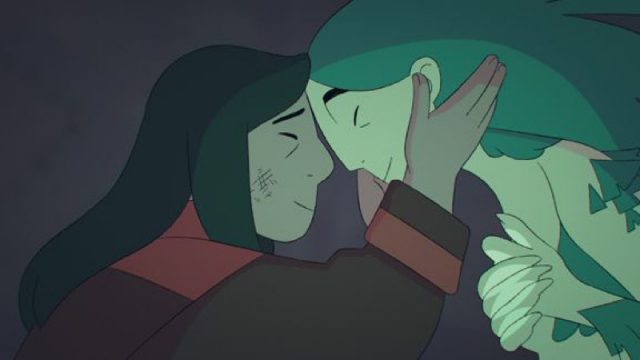
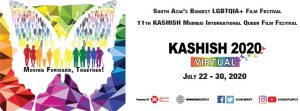

![Powerful Pride documentary Legendary Children [All Of Them Queer] streaming very soon](https://globalindianstories.org/wp-content/uploads/2025/06/Legendary-streaming-release-featured-238x178.jpg)
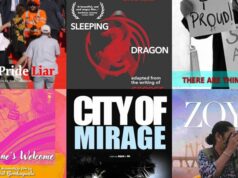


![Powerful Pride documentary Legendary Children [All Of Them Queer] streaming very soon](https://globalindianstories.org/wp-content/uploads/2025/06/Legendary-streaming-release-featured-100x75.jpg)

